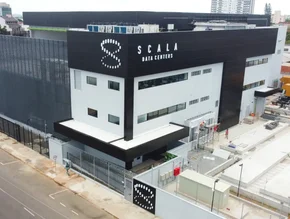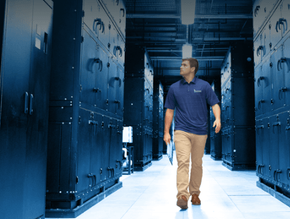The growing demand for energy-efficient data centres

Although critical infrastructure, data centres are responsible for a significant portion of global energy consumption, and their energy usage is only expected to grow as the demand for data increases. To meet net-zero emissions targets, data centres need to make significant investments in energy efficiency measures.
Some of the key areas for energy efficiency would involve upgrading IT equipment to more energy-efficient models, which would include servers, storage devices, and networking equipment. Also, by implementing virtualisation and cloud computing, these technologies could help to consolidate workloads, reduce the overall amount of IT equipment needed, and optimise cooling systems.
Cooling is one of the largest energy consumers in data centres, so optimising cooling systems can have a big impact on energy efficiency. This would include using more efficient cooling technologies, such as liquid cooling, and implementing measures to improve airflow. As well as this, by improving power management and using more efficient power supplies, these measures could help to reduce power losses.
Reducing environmental impact
When thinking about the future, by adopting renewable energy sources data centres can reduce their reliance on fossil fuels by purchasing renewable energy, such as solar or wind power. They can also generate their own renewable energy on-site.
Steve Campbell-Ferguson, Global Lead for Design at NTT Global Data Centers, explains that investing more in renewables on its own will not mitigate any concurrent need to push rack densities or invest in more efficient cooling. “The IT is, basically in my role, a big electric heater. And obviously, a more dense electric heater introduces other problems, but that’s it in terms of the link with solar.”
Stepping back and assessing current power procurement practices is crucial for achieving the goal of ‘squaring the circle’. This involves examining existing energy consumption patterns, identifying inefficiencies, and implementing strategies to reduce energy usage. Additionally, further investment in other energy efficiency technologies is essential to enhance overall energy performance.
Liquid-cooled racks, for example, offer significant energy savings by removing heat more effectively from high-density computing equipment. Furthermore, evaluating whether immersive or direct-to-chip cooling designs are more suitable for specific applications is vital for optimising energy consumption.
A focus on the power procurement ecosystem
Bruno Berti, Senior Vice President of Global Product Management at NTT Global Data Centers, agrees that high-density heat exchange and advanced cooling will continue to be required for efficiencies and cost-effective moves, such as increasing ambient temperatures. For example, while higher densities at the rack can need less space, more room is required for on-site solar.
Rather than allocating a substantial budget directly to solar initiatives, NTT’s focus is on the enhancement of its power procurement ecosystem to meet the growing demand for renewable energy, citing multiple reasons for this strategic focus.
“[Increasing power demand] is really just causing us to accelerate buying of more of those renewable sources, because our commitment regardless is to be 100% renewable and help our clients get there because they’re demanding that as well.” says Berti.
As stated, data centres are a crucial part of our infrastructure, but they come with a significant environmental impact. By carefully balancing their investments in renewable energy with measures to improve efficiency at rack level, data centre operators can reduce their environmental impact while also improving their energy efficiency.
This will be increasingly important as data centre density continues to rise and will help to reduce their impact on the planet and create a more sustainable future.
******
For more insights into the world of Data Centre - check out the latest edition of Data Centre Magazine and be sure to follow us on LinkedIn & Twitter.
Other magazines that may be of interest - Mobile Magazine.
Please also check out our upcoming event - Sustainability LIVE Net Zero on 6 and 7 March 2024.
******
BizClik is a global provider of B2B digital media platforms that cover Executive Communities for CEOs, CFOs, CMOs, Sustainability leaders, Procurement & Supply Chain leaders, Technology & AI leaders, Cyber leaders, FinTech & InsurTech leaders as well as covering industries such as Manufacturing, Mining, Energy, EV, Construction, Healthcare and Food.
BizClik – based in London, Dubai, and New York – offers services such as content creation, advertising & sponsorship solutions, webinars & events.






